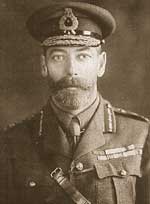George V

Georg V (f. 1865, konge af Storbritannien, søn af Edvard VII og Alexandra af Danmark; indtrådte i marinen 1877, 1891 hertug af York, 1892 ved broderen Albert Victors død tronarving, 1893 gift medVictoria Mary, prinsesse af Teck (f. 1867). Georg blev 1901 prins af Wales ved faderens tronbestigelse; besøgte 1901 Australien, Sydafrika og Canada, 1905-06 Indien med sin gemalinde og 1908 atter Canada. Besteg tronen maj 1910 efter faderens død. Hyldedes i Indien ved Durbaren i Delhi januar 1912. Georgs politiske holdning er altid strengt konstitutionel og hans personlige indflydelse næppe så stor som faderens. Søgte forgæves juli 1910 og juli 1914 af mægle i forfatningskampen og striden om Irlands selvstyre. – Sønner: Edvard (f. 1894), Albert (f. 1895) o.fl. (HK4/1922)
- Første Verdenskrig, 1914-18
George, the second son of Edward VII and Alexandra of Denmark, was born at Marlborough House on 3rd June, 1865. Most of his childhood was spent at Sandringham, Buckingham Palace and Balmoral.
After being educated at home by the Rev. J. N. Dalton, George became a naval cadet at Dartmouth. By 1889 he was commander of a torpedo boat. However, in January 1892, his naval career came to an end when his older brother, Prince Edward, died of pneumonia. Edward had been engaged to marry his German cousin, Princes Mary of Teck. It was now decided she should marry George instead.
George was now heir to the throne and it was decided that he could no longer risk his life as a naval commander. He was granted the title, the Duke of York and became a member of the House of Lords. George was also given a political education that included an in-depth study of the British Constitution. However, unlike his father, he did not learn to speak any foreign languages.
George, Duke of York, married Princess Mary in 1893. Mary had six children: Edward (1894-1972), George (1895-1952), Mary (1897-1965), Henry (1900-1974), George (1902-1942) and John (1905-1919).
Edward VII died in 1910 during the Liberal Government's conflict with the Lords. His father had promised to give his support to the reform of the House of Lords if Herbert Asquith and the Liberal Party won a General Election on this issue. Although the 1910 General Election held in December did not produce a clear victory for the Liberals, George V agreed to keep his father's promise.
When the House of Lords attempted to stop the passage of the 1911 Parliament Act, George V made it clear he was willing to create 250 new Liberal peers in order to remove the Conservative majority in the Lords. Faced with the prospect of a House of Lords with a permanent Liberal majority, the Conservatives agreed to let the 1911 Parliament Act become law.
The outbreak of the First World War created problems for the royal family because of its German background. Owing to strong anti-German feeling in Britain, it was decided to change the name of the royal family from Saxe-Coburg-Gotha to Windsor. To stress his support for the British, the king made several visits to the Western Front. On one visit to France in 1915 he fell off his horse and broke his pelvis.
In 1917 George V took the controversial decision to deny political asylum to the Tsar Nicholas II and his family after the Bolshevik Revolution. People where shocked by George's unwillingness to protect his cousin but his advisers argued that it was important for the king to distance himself from the autocratic Russian royal family. Some people questioned this decision when it became known that the Bolsheviks had executed Tsar Nicholas, his wife and their five children.
In 1924 George V appointed Ramsay MacDonald, Britain's first Labour Prime Minister. Two years later he played an important role in persuading the Conservative Government not to take an unduly aggressive attitude towards the unions during the General Strike. It an attempt to achieve national harmony during the economic crisis of 1931, the king persuaded MacDonald to lead a coalition government. The following year George V introduced the idea of broadcasting a Christmas message to the people.
The king had not enjoyed good health for a long time and during his final years he spent much of his time on his grand passion, philately. Patriotically, he concentrated on collected stamps from the British Empire. George V died of influenza on 20th January, 1936. His eldest son, Edward now became king.